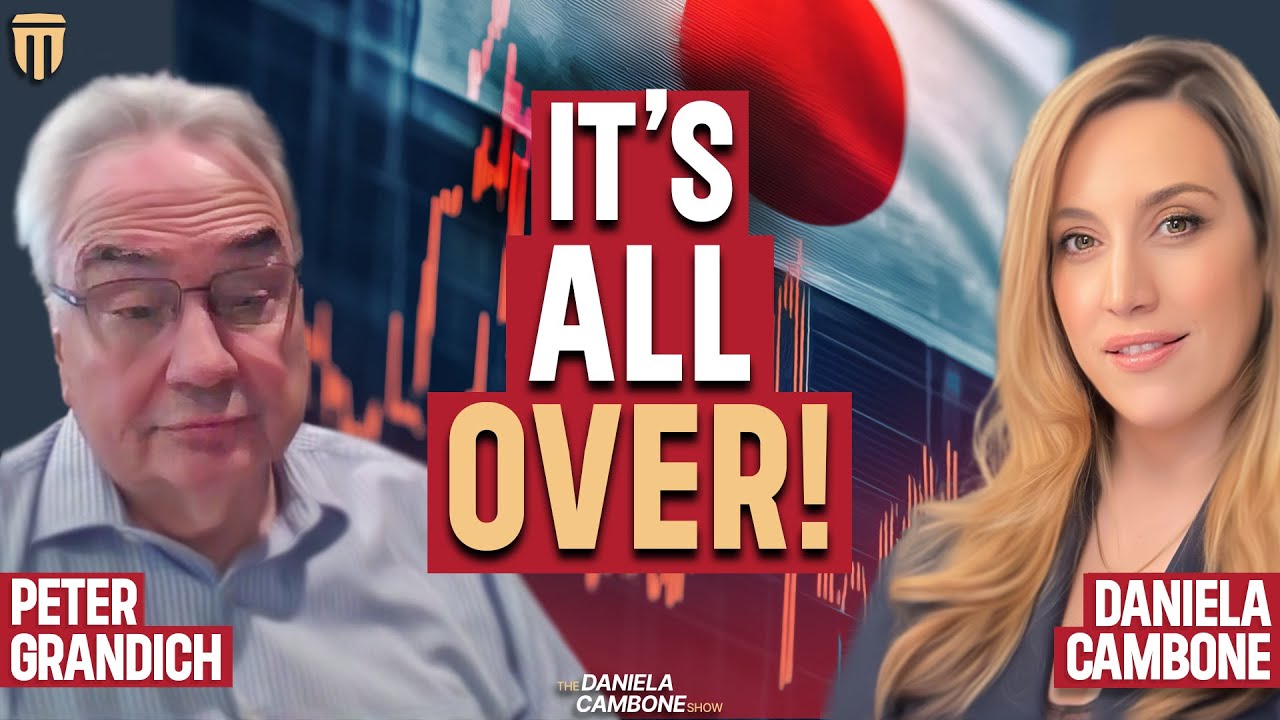Video
David Addresses $100 XRP

Welcome to Zach Rector’s channel!
iTrust Capital- https://www.itrustcapital.com/go/zach-rector
Legal & Estate Planning- https://calendly.com/new-client-specialists/15-minute-interview-affiliate?a1=Rector&month=2025-12
Are you ready to take advantage of the greatest transfer of wealth in world history?
Join our community at http://www.ZachRector.com and discover how you can not only survive, but thrive in this exciting time.
XRP Family MERCH- https://zachrector.com/shop/
Patreon/Discord Private Community- https://www.patreon.com/zachrector
Buy XRP & Trade Crypto-
Caleb & Brown- https://www.calebandbrown.com/affiliates/zach-rector/
Uphold- https://wallet.uphold.com/signup?referral=7ae0597d45
Coinbase- https://coinbase.com/join/PJCHZE2?src=ios-link
Coinbase Advanced Trading- https://advanced.coinbase.com/join/XXTYJ2Z
First Ledger- https://firstledger.net/?ref=DO9SdgMahaeK
Send XRP Tips & NFTs- r41a9RBNQYVx1XowGUUNEbJxKdKnMpHQEo
Precious Metals- https://zachrector.com/gold-and-silver/
Book 1 on 1 Call with Zach- https://calendly.com/zachrector/30min?month=2024-09
Crypto Wallets-
Ellipal- https://www.ellipal.com/?rfsn=6318619.6c7e7c
DCent Wallet- https://store.dcentwallet.com/products/biometric-wallet-affiliates?bg_ref=qBGObYeQ71
Trezor- https://trezor.io/trezor-model-t?transaction_id=102790791fb667a080e84dbbf37fc1&offer_id=134&affiliate_id=10442
Follow us on social media for the latest updates on:
Twitter (https://www.twitter.com/ZachRector7),
Rumble (https://www.rumble.com/user/zachrector7),
YouTube (https://www.youtube.com/user/Rector94),
TikTok (https://www.tiktok.com/@ZachRector7).
Thank you for joining us on this journey to financial freedom!
#xrp #ripple #xlm #stellar #xdc #buyback
#CryptocurrencyExchange #CryptocurrencyWallet #CryptocurrencyMarketNews #AltcoinInvesting #BlockchainTechnology #CryptocurrencyRegulations #HODL
#trading #investing #altcoins #crypto #blockchain #cryptocurrency #bitcoin
source
Video
DU SOL Financial Accounting Important Questions With Answer Bcom Hons 1st Semester Exam 2026

DU SOL Financial Accounting Important Questions With Answer Bcom Hons 1st Semester Exam 2026
Telegram: https://t.me/CollegeUpdates
…………………………………………………….
Telegram Discussion Group link👉 https://t.me/College_Updates_Helpline
2nd Join link 👉 https://t.me/+VfFgI3kMBE5eztHJ
Follow the College Updates channel on WhatsApp: https://whatsapp.com/channel/0029Va5,9vov2f3EFzke9kj3t
IGNOU Official Group link 👉https://t.me/IGNOU_OFFICIAL_GROUP
……………………………………………………. Facebook Page Link ➡ https://m.facebook.com/profile.php?id=102509558441245&ref=content_filter
Twitter : https://twitter.com/CollegeUpdatess?s=09
…………………………………………………..
…………………………………………………..
Thanks For
Watching…… CollegeUpdates
,
#dusol #solupdates #solexam2026 #bcomhons #financialaccounting #sol1stsemesterexam2026
source
Video
How Cryptocurrency ACTUALLY Works? Bitcoin 3D Animation

Want to know How Cryptocurrency ACTUALLY Works? This Bitcoin 3D Animation video is for you.
Want to learn 3D Animation? For 3D Course Queries, WhatsApp us at: +91-9983083303 or visit professorofhow.com
In this video, you’ll learn how Blockchain Technology is used in the working mechanism of Cryptocurrency.
Specifically, here’s what you’ll learn in this video:
First, I’ll explain Barter System and how we evolved to using gold for trades in ancient times. Then I’ll explain why people couldn’t continue with gold for a longer time and had to switch to currency. Basically, the fundamental mechanism of the economics you need to understand the procedure of Cryptocurrency.
Next, I’ll take an example of the shoe trade and explain what happens when you make an online payment using PayTM or Google Pay.
Further, we’ll use the same shoe trade example on Bitcoin to better understand real-life examples. In the process you’ll know about: Bitcoin mining, Miners, Blockchain technology, peer-to-peer electronic system, trustless decentralised financial system & a lot more.
In short, 3D Animation of Bitcoin, Ethereum, Tether, Binance, Dogecoin, Shiba Inu will make you fully understand How Cryptocurrency ACTUALLY Works?
😲Watch More Awesome 3D Animations Here👇
🤔How a Gun Silencer Works? 👉 https://youtu.be/8Z3lRcvNzuw
🤔How a vaccine Kills Coronavirus? 👉 https://youtu.be/WHWUfk8-sNw
🤔How Gun Works?👉 https://youtu.be/fNWKO_Zd3j8
🤔How Corona Kills?👉 https://youtu.be/0G0vq3tVAKE
🤔How FASTag Works?👉 https://youtu.be/wbErZjLxlBM
🤔What Exactly Happened In Pulwama Attack👉 https://youtu.be/rn2rHctulfQ
🤔How Grenade Works?👉 https://youtu.be/LOseXT3rChI
🤔How will Ram Mandir Look Like?👉 https://youtu.be/ndU5YYmH7xk
🙃Better Time Connecting Social Media Is Today!🙃
————❤️JOIN PROFESSOR ON SOCIAL MEDIA❤️————-
Instagram👉 https://www.instagram.com/professorofhow/
Twitter👉 https://twitter.com/professorofhow
Facebook👉 https://www.facebook.com/professorofhow
LinkedIn👉 https://www.linkedin.com/in/professor-of-how/
Subscribe to This Channel👉 https://goo.gl/Dky5kX
Credits:
Squid_Boss: https://sketchfab.com/sanyaork
Squid_Staff: https://sketchfab.com/GianmArt
Gun: https://sketchfab.com/reijin
Pc: https://sketchfab.com/Yolala1232
Money_Stack: https://sketchfab.com/caio17011
Gun: https://sketchfab.com/deryckeredries
Ancient_Scene: https://sketchfab.com/vashar
Cat: https://sketchfab.com/liye.yan1994
Donkey: https://sketchfab.com/Neut2000
table: https://sketchfab.com/Joshua_Willcock
source
Video
Japan Just Triggered Biggest Unwind in Financial History – THIS Changes Everything: Peter Grandich

“The invisible bid that’s been propping up the entire developed world for a generation is vanishing in real time,” warns financial strategist Peter Grandich of Peter Grandich & Company. In today’s interview with Daniela Cambone, he details how Japan’s seismic shift away from its three-decade-long role as the world’s “money printer” is set to send shockwaves through the global economy.
Grandich breaks down the explosion of the “greatest carry trade in financial history,” explaining how for 30 years, Japan’s zero-interest policy artificially suppressed borrowing costs worldwide, fueling everything from cheap mortgages to sky-high stock multiples. “That single number just ended it,” he states, revealing how the end of Japan’s endless money printing is already impacting U.S. Treasury markets.
✅ FREE RESOURCES
Download The Private Wealth Playbook — a data-backed guide to strategically acquiring gold and silver for maximum protection, privacy, and performance. Plus, get Daniela Cambone’s Top 10 Lessons to safeguard your wealth (FREE) 👉 https://www.danireport.com/
📞 SCHEDULE YOUR FREE STRATEGY CALL
Talk to a senior analyst today and discover how to protect your future with physical gold and silver. 👉 https://calendly.com/itmtrading/500?utm_content=DC05052025 or call 866-706-9061
👋 STAY IN TOUCH WITH ITM & DANIELA
🟩 Schedule a Strategy Session: 866-706-9061
🟩 Email us at services@itmtrading.com
🟩 Official Homepage http://www.itmtrading.com
🟩 Listen On The Go: https://anchor.fm/itmtrading
🟩 ITM’s Twitter: https://twitter.com/itmtrading
🟩Daniela’s Twitter: https://twitter.com/DanielaCambone
🟩Daniela’s Newsletter: https://learn.itmtrading.com/daniela
🌎 ABOUT ITM TRADING:
For more than 30 years, Phoenix-based ITM Trading has been a nationally recognized organization for trusted, data-backed research and investor education in the precious metals industry. They strategically assist clients nationwide, specializing in the different functions that physical gold and silver products provide in a diverse portfolio. ITM Trading’s mission is to give investors the knowledge, analysis, and lifetime strategies they require to confidently navigate the intricate monetary policies that restrict economic freedoms. They help build each client a custom portfolio designed to protect and grow their wealth and assets during economic downturns, hyperinflation, and currency resets.
Disclaimer: The information provided in this video is for educational purposes only and should not be construed as financial advice. Gold and silver prices are influenced by many factors and may fluctuate. All assets carry some risk and past performance does not guarantee future results. The views expressed by our hosts or guests do not always reflect the views of ITM Trading nor guarantee a specific outcome. Always conduct your own research and consult a financial advisor before making any investment decisions.
#gold #gold2025 #finance #globalmarkets #economiccrisis #japan #japaneconomy #cambone #bonds #markets
ITM Trading Inc. © Copyright, 1995 – 2025 All Rights Reserved.
source
Video
When you try to give money to your boyfriend #couplegoals #couplecomedy
Video
SIAPA PLATFORM CRYPTO PALING AMAN?
Video
Power Of ICE-CUBES Buisness #finance #shorts

Power Of ICE-CUBES Buisness #finance
#investing #personalfinance #compounding #financialfreedom #wealthbuilding #longterminvestment #moneymanagement #financialplanning #investmenttips #financialgrowth #casakchijain #shorts #youtubeshorts
source
Video
Banani – MONEY (Offizielles Musikvideo)

STREAME JETZT DEN NEUEN SONG “MONEY”
https://sptfy.com/BANANIMONEY
⭐ STARCODE: LAMI
👕 LAMI MERCH SHOP ► https://lami-shop.de
📸 Instagram ► https://www.instagram.com/sussy_lami/
📱 TikTok ► https://www.tiktok.com/@sussy_lami
🌐 Roblox Gruppe ► https://www.roblox.com/groups/9105377/LAMI-GRUPPE#!/
🌌 Discord ► https://discord.gg/Ctsqa7zapz
🎮 Roblox Profil ► https://www.roblox.com/users/1492820190/profile
#brookhaven #robloxbrookhaven #roblox
source
Video
Skill Financial Planning yang Harus Kamu Kuasai Biar Gaji Gak Cuma Numpang Lewat

Mulai financial planning itu nggak harus ribet.
Di episode ini, kita bahas langkah awal, pentingnya dana darurat, utang sehat, sampai cara seimbangin nabung, investasi, dan proteksi. Wajib dengerin buat kamu yang mau lebih siap atur keuangan!
—–
Alife Partner
Host:
Thea Fitria
https://www.instagram.com/theafit_joso?igsh=MXNxMTd6dWdqaTRkMA==
Speakers:
Astrid Ramadhina
https://www.instagram.com/astridramadhina?igsh=dmNqdmZ1YXh0ZWZs
Jessica Suwarsono
https://www.instagram.com/jessicajsuw?igsh=MmkxZjVhdGJiajI3
—–
Alife Talk memberikan konten informatif dan juga edukatif seputar asuransi yang dikemas dalam bentuk podcast dengan berbagai narasumber yang pastinya bisa menambah insight Alife Friends tentang asuransi.
Don’t forget to like and subscribe to our YouTube channel!
—–
Want to know more about us?
Website:
https://alifebyvision.id/
Instagram:
https://www.instagram.com/alifebyvision?igsh=cmFtZTZya3EyM3k4
source
Video
Never Choose Money Over Humanity #motivation #lifelessons #motivationalspeech #wisdom #mindset

Never Choose Money Over Humanity
A homeless man stole water to save a life—and it exposed who truly had a heart.
This moment proves money can’t buy compassion.
#Shorts
#ViralShorts
#KindnessMatters
#HumanityFirst
#LifeLesson
#MoralStory
#TrueCharacter
#InstantKarma
#FaithInHumanity
#EmotionalStory
#ShortFilm
#StoryTime
source
Video
Why Everything Is Selling Off (Starting With Bitcoin)

The Crypto Crash Isn’t What You Think
► Apply for the Gemini Credit Card: http://gemini.com/andrei
#GeminiCreditCard #CryptoRewards This video is sponsored by Gemini. All opinions expressed by the content creator are their own and not influenced or endorsed by Gemini.
The Gemini Credit Card is issued by WebBank. For more information regarding fees, interest, and other cost information, see Rates & Fees: gemini.com/legal/cardholder-agreement.
Some exclusions apply to instant rewards in which rewards are deposited when the transaction posts. All qualifying purchases under the 4% back category earn 4% back on up to $300 in spend per month (then 1% thereafter in that month). Spend cycle will refresh on the 1st of each calendar month. See Rewards Program Terms for details: gemini.com/legal/credit-card-rewards-agreement.
Analysis reflects Gemini Credit Card holders who earned bitcoin rewards between 10/08/2021 and 10/05/2024 and held all such rewards in their Gemini account through 10/05/2025. Calculation is based on bitcoin market value changes during the holding period. Individual results will vary depending on spend behavior, chosen rewards currency, holding duration, and market performance. Past performance is not indicative of future results. This information is for general informational purposes only and does not constitute investment advice.
► My Stock Portfolio + Tracker https://www.brrrr.ai
► How To Protect Your Bitcoin (step by step), use Code “ANDREI40” to get 40% off https://stan.store/andreijikh
► Where I Buy My Bitcoin: https://gemini.sjv.io/7a0OL5
► How I went from Zero To A Million: https://www.zerotoamillion.com
► Ledger Discount Link: https://shop.ledger.com/pages/black-friday-andrei-jikh?r=535643c13ab0
► My Stock Portfolio + Stock Tracker: https://www.brrrr.ai
► Open A Roth IRA:
► Follow Me On Instagram: https://www.instagram.com/andreijikh/
► How I Protect My Bitcoin: https://shop.ledger.com/pages/ledger-nano-x?r=535643c13ab0
My PO Box:
Andrei Jikh
4132 S. Rainbow Blvd # 270
Las Vegas, NV 89103
DISCLOSURE: None of this is meant to be construed as investment advice, it’s for entertainment purposes only. Links above include affiliate commission or referrals. I’m part of an affiliate network and I receive compensation from partnering websites. The video is accurate as of the posting date but may not be accurate in the future.
You should not treat any opinion expressed on this Youtube channel as a specific inducement to make a particular investment or follow a particular strategy, but only as an expression of opinion. Opinions expressed are based upon information considered reliable, but this Youtube channel does not warrant its completeness or accuracy, and it should not be relied upon as such. This Youtube channel is not under any obligation to update or correct any information provided in these videos. Statements and opinions are subject to change without notice. No compensation is received by this Youtube channel for the opinions expressed.
Past performance is not indicative of future results. This Youtube channel does not guarantee any specific outcome or profit. You should be aware of the real risk of loss in following any strategy or investment discussed on this Youtube channel. Strategies or investments discussed may fluctuate in price or value. Investors may get back less than invested. Investments or strategies mentioned on this Youtube channel may not be suitable for you. This material does not take into account your particular investment objectives, financial situation or needs and is not intended as recommendations appropriate for you. You must make an independent decision regarding investments or strategies mentioned on this Youtube channel. Before acting on information on this Youtube channel, you should consider whether it is suitable for your particular circumstances and strongly consider seeking advice from your own financial or investment adviser.
source
-

 Crypto World6 days ago
Crypto World6 days agoSmart energy pays enters the US market, targeting scalable financial infrastructure
-

 Politics6 days ago
Politics6 days agoWhy is the NHS registering babies as ‘theybies’?
-

 Crypto World7 days ago
Crypto World7 days agoAdam Back says Liquid BTC is collateralized after dashboard problem
-

 Video3 days ago
Video3 days agoWhen Money Enters #motivation #mindset #selfimprovement
-

 Fashion6 days ago
Fashion6 days agoWeekend Open Thread – Corporette.com
-

 Tech2 days ago
Tech2 days agoWikipedia volunteers spent years cataloging AI tells. Now there’s a plugin to avoid them.
-

 NewsBeat7 days ago
NewsBeat7 days agoDonald Trump Criticises Keir Starmer Over China Discussions
-

 Politics4 days ago
Politics4 days agoSky News Presenter Criticises Lord Mandelson As Greedy And Duplicitous
-

 Crypto World6 days ago
Crypto World6 days agoU.S. government enters partial shutdown, here’s how it impacts bitcoin and ether
-

 Sports5 days ago
Sports5 days agoSinner battles Australian Open heat to enter last 16, injured Osaka pulls out
-

 Crypto World5 days ago
Crypto World5 days agoBitcoin Drops Below $80K, But New Buyers are Entering the Market
-

 Crypto World4 days ago
Crypto World4 days agoMarket Analysis: GBP/USD Retreats From Highs As EUR/GBP Enters Holding Pattern
-

 Business5 hours ago
Business5 hours agoQuiz enters administration for third time
-

 Crypto World6 days ago
Crypto World6 days agoKuCoin CEO on MiCA, Europe entering new era of compliance
-
Business6 days ago
Entergy declares quarterly dividend of $0.64 per share
-

 Sports4 days ago
Sports4 days agoShannon Birchard enters Canadian curling history with sixth Scotties title
-

 NewsBeat11 hours ago
NewsBeat11 hours agoStill time to enter Bolton News’ Best Hairdresser 2026 competition
-

 NewsBeat3 days ago
NewsBeat3 days agoGAME to close all standalone stores in the UK after it enters administration
-

 NewsBeat3 days ago
NewsBeat3 days agoUS-brokered Russia-Ukraine talks are resuming this week
-

 Crypto World2 days ago
Crypto World2 days agoRussia’s Largest Bitcoin Miner BitRiver Enters Bankruptcy Proceedings: Report






